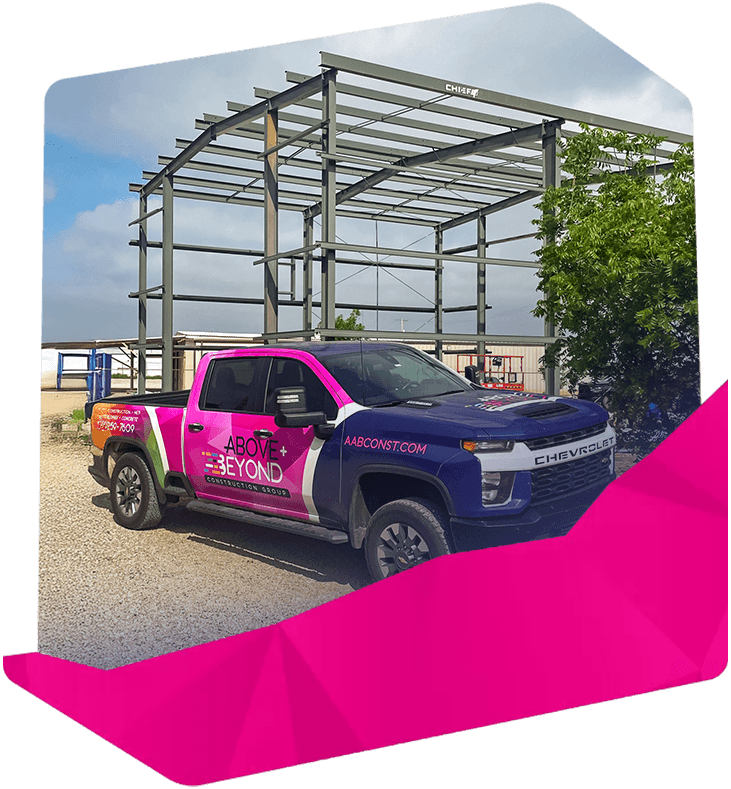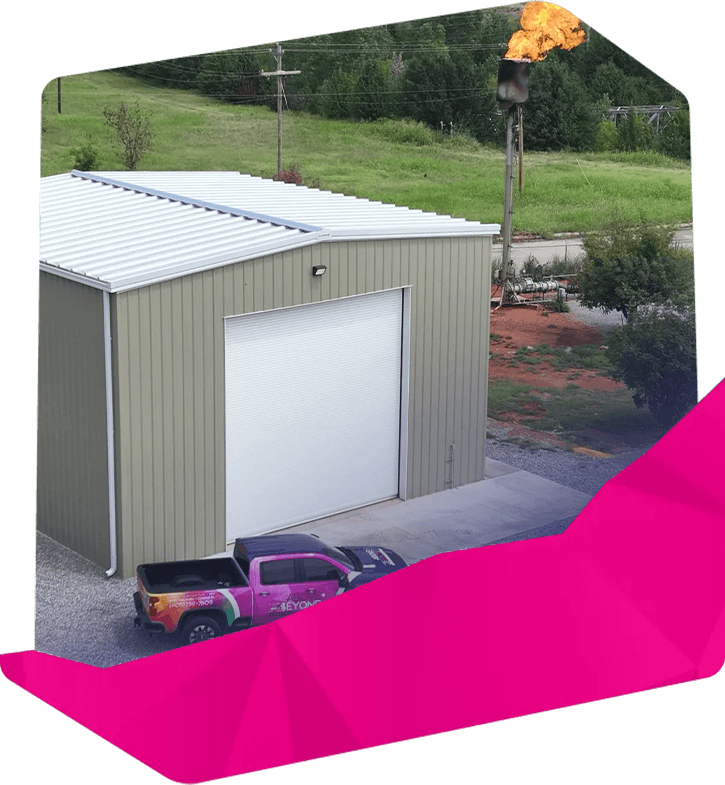
Oklahoma City Concrete Foundation Construction
Concrete Foundation Contractors Serving Edmond and Yukon, OK
Concrete foundations are an essential component of new construction projects, providing the stability and durability necessary to support both residential and commercial structures. They serve as the base upon which buildings are constructed, ensuring that the weight of the structure is evenly distributed and preventing issues like settling or shifting over time. Concrete foundations are particularly critical in areas with basements and crawl spaces, as they form the walls and floors of these subsurface areas, offering protection against moisture, pests, and temperature fluctuations. The quality and design of the foundation play a pivotal role in the longevity and safety of structures of all kinds.
At Above + Beyond Construction Group, we are ready to literally provide a strong foundation for your next construction project. We are a family-owned company that offers a full suite of concrete and building services that can be tailored to meet the unique needs of residential and commercial projects of all sizes.
Whether you're building a residential home or a commercial facility or adding a basement or crawl space, our experienced team is equipped to handle every aspect of the foundation process. From initial site preparation and excavation to precise pouring and finishing, we work to complete each stage of the project with the highest standards of craftsmanship and durability. Our licensed and insured contractors utilize advanced equipment, industry-leading techniques, and premium materials to deliver reliable foundations that stand the test of time. We also provide workmanship labor warranties in accordance with your project in addition to the manufacturer warranties on all materials used.
Discuss your needs with our Oklahoma City concrete foundation construction professionals today by calling (405) 993-4244 or contacting us online. We offer free estimates!
Types of Concrete Foundations
Concrete foundations come in various types, each designed to meet specific structural requirements and environmental conditions. The ideal choice of foundation type depends on factors like soil composition, climate, building load, and intended use of the structure. After assessing your project’s specifications, our team at Above + Beyond Construction Group can help you select the right foundation for your new building.
Some of the most common types of concrete foundations and their applications include:
- Pre-engineered building and weld-up building foundations.
- Monolithic Foundations.
- Stem Wall Foundations.
- Storm Shelters and Foundations.
- Slab-on-grade foundations. Slab-on-grade foundations consist of a single, thick layer of concrete poured directly onto the ground and reinforced with steel rods. This type of foundation is ideal for residential homes, garages, and sheds, as it can provide a cost-effective and straightforward solution. Slab-on-grade foundations work best on stable, well-drained soil as they lack the depth needed to combat soil movement in freeze-thaw cycles. Ideal for metal building construction as well as commercial building construction.
What Should I Consider When Planning My Construction Project’s Foundation?
Planning the foundation of your construction project is a critical step that lays the groundwork for the entire structure. A solid foundation not only supports the building but also safeguards it from potential issues like settling, cracking, or moisture intrusion.
Our Oklahoma City concrete foundation construction experts can help you evaluate several factors during the planning process, including:
- Site and soil conditions. Conducting a soil analysis helps identify factors like soil composition, drainage capacity, and load-bearing capability. Certain soil types, such as clay or expansive soils, may require additional preparation, such as compaction or stabilization, to prevent foundation movement. Additionally, examining the slope of the site and the potential for erosion or flooding can influence the design and placement of the foundation.
- Climate and weather patterns. In areas like Oklahoma with freeze-thaw cycles, frost heave can pose a threat to foundations if they are not constructed below the frost line or equipped with adequate insulation, such as in frost-protected shallow foundations. Similarly, regions prone to heavy rainfall or flooding may demand elevated foundations or additional drainage systems to protect against water intrusion. Considering the weather patterns during construction is also crucial to avoid delays or compromises in workmanship.
- Building load and design. The weight and design of the building significantly impact the foundation requirements. A larger, multi-story structure will impose greater loads on the foundation than a single-story home, necessitating more robust materials or designs like T-shaped or basement foundations. Additionally, unique architectural features, such as large spans, overhangs, or non-standard shapes, might require specialized foundation support, such as reinforced footings or piers, to maintain stability and integrity.
- Local building codes and regulations. Adhering to local building codes and regulations is not only a legal obligation but also a safeguard for structural safety. These codes specify minimum requirements for foundation depth, material usage, and structural reinforcements based on local environmental and geotechnical considerations. Our experienced team can help you incorporate these guidelines into your plan and avoid costly revisions or penalties during construction.
- Drainage and waterproofing solutions. Proper drainage and waterproofing are essential to maintaining the longevity of your foundation. Excess water can weaken soils and lead to structural problems, such as settlement or cracks. Incorporating features like perimeter drains and gutters, as well as grading the landscape to direct water away from the foundation, can mitigate this risk. Applying waterproofing membranes or sealants to foundation walls, particularly in basements or crawl spaces, can further protect your structure from moisture penetration.
- Construction budget and timeline. Balancing the project budget with the required quality of the foundation is an important consideration. Cutting corners during the foundation phase can lead to costly repairs or structural failure later on. You must allocate sufficient resources to materials, site preparation, and skilled labor to achieve a high-quality outcome. Additionally, you should factor in construction timelines, as delayed decisions or inclement weather can impact project schedules and increase costs.

Why Choose Above + Beyond Construction Group?
-
Open Lines Of CommunicationYou can call us anytime to schedule an appointment or simply drop us a message on our website. We are always happy to hear from you!
-
Affordable Financing OptionsWe offer a variety of options. Call to learn about the details.
-
Insured for Your Peace of MindEntrust your construction needs to licensed, insured professionals.
-
Offering 100% Free QuotesTalk to our construction team today during a free estimate.

Can I Add a Basement or Crawl Space to a Finished Structure in OK?
Adding a basement or crawl space to an already-finished structure in Oklahoma is a challenging and likely expensive but potentially possible undertaking – provided proper planning and execution are involved. Retrofitting an existing building to include such features requires a thorough evaluation of the structure's current foundation and a clear understanding of soil conditions and regional factors unique to Oklahoma.
The first step involves assessing the structural integrity of the existing building. We can evaluate whether the current foundation can support significant modifications. This evaluation is especially critical because excavation near or beneath an existing foundation can compromise its stability if proper precautions are not taken. Additionally, Oklahoma's soil types, which can include expansive clay and sandy loam, need to be examined. These soil conditions can shift or settle unpredictably during excavation, necessitating careful consideration of reinforcement measures for the foundation and surrounding ground.












